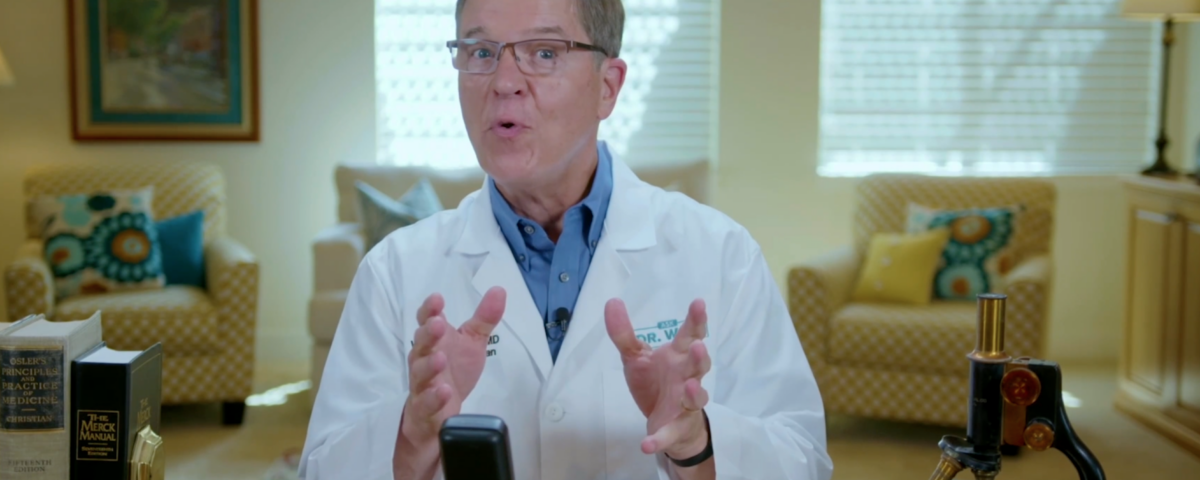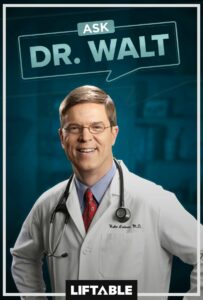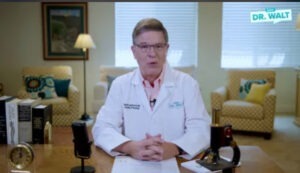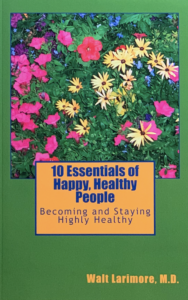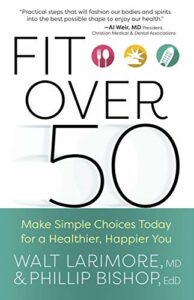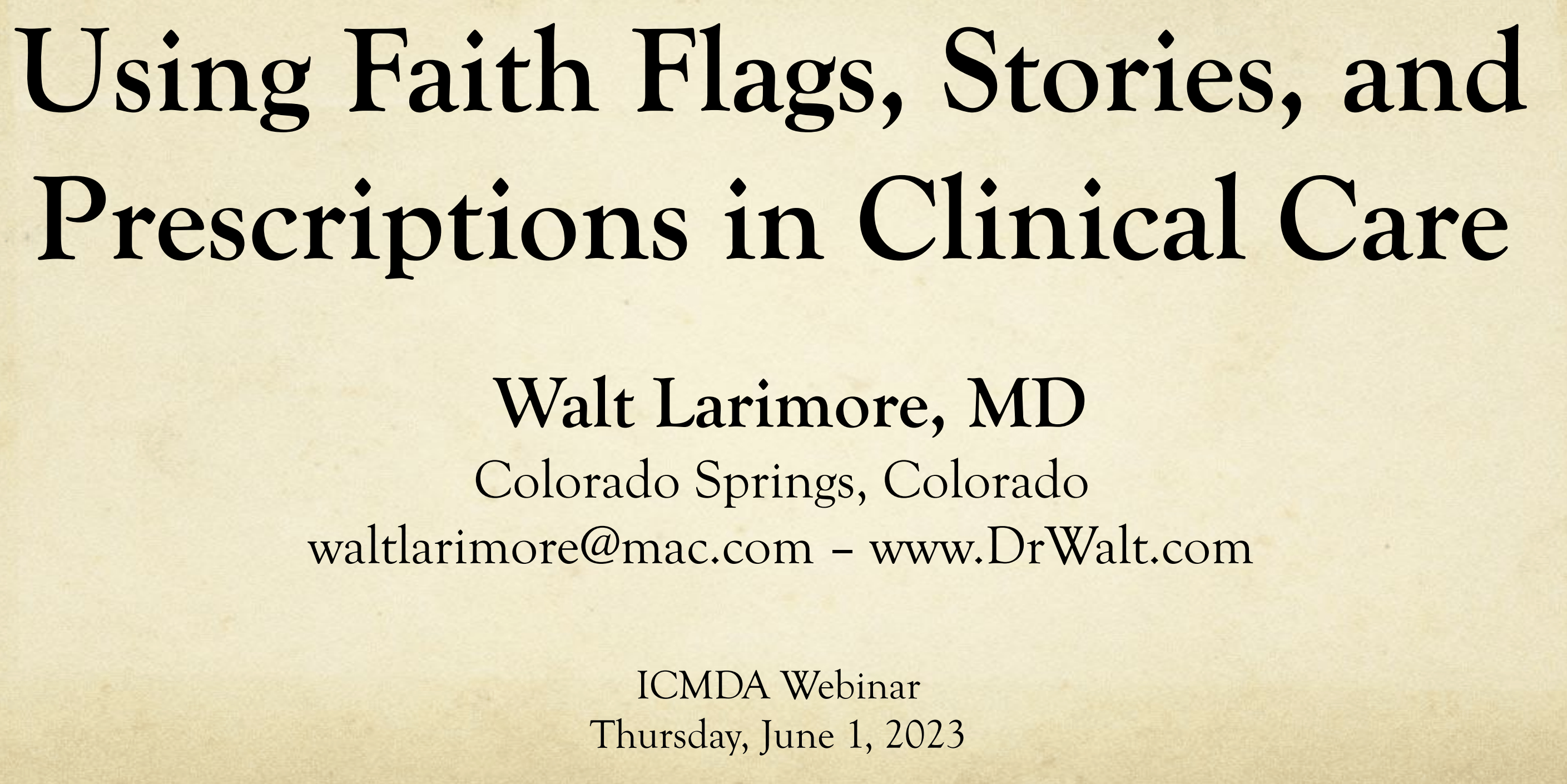
Faith flags, faith stories, and faith prescriptions in clinical practice
August 25, 2023
A wonderful dream about my father
August 30, 2023Ask Dr. Walt 17 – Essential #10 – Team Up with Winning Health Care Professionals OR The Essential of Teamwork
Optimum health requires not only that you take personal responsibility for your healthcare and choose to be your own healthcare quarterback, but also that you wisely choose your healthcare team. Who should you choose to make up your winning team? I’ll tell you how on today’s episode of Ask Dr. Walt.
From 2021-2022, I was honored to host a TV show on LiftableTV, “Ask Dr. Walt.” In this series, I’m explaining the 10 key habits or 10 essentials of happy, healthy people.
Optimum health requires not only that you take personal responsibility for your healthcare and choose to be your own healthcare quarterback, but also that you wisely choose your healthcare team. Who should you choose to make up your winning team? I’ll tell you how on today’s episode of Ask Dr. Walt: Essential #9 – Team Up with Winning Health Care Professionals OR The Essential of Teamwork
You can click below to watch a video of the show, or I’ve put the show transcript at the end of the blog if you’d prefer.
You can learn more about this topic in my best-selling book, 10 Essentials of Happy, Healthy People: Becoming and staying highly healthy or Fit over 50: Make Simple Choices for a Healthier, Happier You.
CLICK HERE FOR 10 E’S CLICK HERE FOR Fo50
Disclaimer: The Ask Dr. Walt show is designed for entertainment purposes to give information on various medical conditions, treatments, and procedures for your personal knowledge and to help you be a more informed consumer of medical and health services.
SHOW TRANSCRIPT
TEASE:
Optimum health requires not only that you take personal responsibility for your healthcare and choose to be your own healthcare quarterback, but also that you wisely choose your healthcare team. Who should you choose to make up your winning team? I’ll tell you how on today’s episode of Ask Dr. Walt.
OPEN:
Hi, everyone. I’m family physician Dr. Walt Larimore and I’m pleased you are taking the time to join me in my home office as today we complete our 10-show discussion about the ten essentials of becoming and staying healthy physically, emotionally/mentally, relationally, and spirituality. WE’VE ALREADY COVERED the first nine essentials of:
- True health
- Self-care
- Reducing SADness
- Forgiveness
- Relationships
- Spiritual health
- Positive self-image, and
- Discovering your destiny
- Become your own healthcare quarterback
TODAY WE’LL COVER THE LAST ESSENTIAL:
- Teamwork in healthcare.
I hope these programs have convinced you of the value of healthcare that considers and embraces the physical, emotional, relational, and spiritual aspects of who you were created to be. Experiencing the best health possible requires not only that you take personal responsibility for your healthcare and choose to be your own healthcare quarterback, as we discussed last time, but also that you wisely choose your healthcare team.
The core of the team is you, as your own healthcare quarterback, a great healthcare coach such as your family physician, and then several others on your healthcare team.
So, let’s take some of your questions and comments about choosing a winning healthcare team. Thanks to all of you who sent in your questions. I can’t answer them all, but appreciate Kylie and Jordan helping me to sort through them and put them in order. At the end of this show, I’ll tell you how to send in your questions for our next program on brain health.
1) Our first question is from Olivia in Memphis, Tennessee. “Dr. Walt, you’ve talked about the importance of everyone having a family physician, but how can I know if that physician shares my spiritual beliefs or not?”
Finding a physician and other healthcare team members who share your spiritual foundation and practices may be crucial for you—and it’s fairly simple. You can ask your pastor or others in your faith community if they’ve found physicians that might meet your needs. Also, you can find a listing of members of the Christian Medical and Dental Associations at CMDA.org. Just click on the “Member Search” tab.
Once you’ve picked a candidate, then schedule an introductory visit. In fact, many physicians will schedule a short “meet and greet” visit at no charge.
At your first visit with a prospective physician, whether a primary care or specialty physician, you can use a spiritual inventory to evaluate whether you and they are on the same page spiritually. Here are a few questions you could ask at your interview of a prospective healthcare professional or during your first official appointment.
- Are you willing to consider my spiritual preferences as you care for me?
- Are you open to discussing the religious or spiritual implications of my healthcare?
- Are you willing to meet or talk with my spiritual leaders (pastor, priest, elders) if needed?
- Are you willing to pray with me—or for me—if I feel the need for prayer?
You could adapt these questions or come up with some of your own to add.
2) Max in Anchorage, Alaska, writes, “Dr. Walt, it seems to me that a pharmacist should be a vital part of everyone’s healthcare team. Would you agree?
I couldn’t agree more. One of the most critical members of everyone’s healthcare team, especially if you take any sort of prescription medications, nonprescription medications, or natural medications such as herbs, vitamins, or supplements, is a trusted pharmacist.
Most pharmacies have consultation areas where you can visit with your pharmacist. If you are taking more than one medication of any sort, I always recommend reviewing these with your pharmacist. This is especially true if you are seeing multiple specialists who may not be aware of possible drug interactions that come with medications your other doctors give you because they are unaware of those medications or don’t use them often.
It surprises most of my patients to learn that all-natural medications—herbs, vitamins, and supplements—can interact negatively with many prescription and over-the-counter medications. Again, if you’re taking more than one medication—prescription, over-the-counter, or natural—always, always, always talk to your pharmacist and have them look up any and all possible interactions.
In addition, if your family physician does not stock the vaccines, you or your children might need, many pharmacies can also provide vaccinations.
3) Gwen in New Brunswick, New Jersey says, “Dr. Walt, in an earlier program you mentioned dental health as being part of our physical health. I’ve never considered my dental office part of my healthcare team. But, I guess I should, right?”
Absolutely, Gwen. Your dental care team, especially your dentist and dental hygienist, can have a positive influence on your physical, emotional, and relational health. The connection between oral health and overall health is clear in multiple studies. As one insurance company writes, “From heart disease to diabetes and oral cancer to premature births, dental care has an impact on total health and well-being.”[i]
4) Karlie from Sugar Land, Texas, writes, “I like how you include emotional, mental, and relationship health in total health. Does everyone need a mental health professional on their healthcare team?”
Karlie, a well-trained Christian family physician or primary care specialist can provide not only basic physical care, but also basic mental, emotional, and relational health care.
But, when needed, your family doc can direct you to a psychologist, professional counselor, social worker, or marriage and family therapist. Each of these professions is licensed, certified, and trained to provide diagnosis and therapy for a variety of mental, emotional, and relational problems.
You can also call the counseling department at Focus on the Family (1-800-A-FAMILY) to find competent faith-based counselors in your area.
Finally, when needed, psychiatrists are physicians, MDs or DOs, that are specially trained in evaluating and treating mental health and disease. Unlike the others I’ve mentioned, these physicians can prescribe medications, order laboratory, and other diagnostic tests, and admit patients to the hospital when necessary. But even psychiatrists themselves usually work with a multidisciplinary team of mental health professionals.
5) Joanne in Lakewood, Washington, says, “Dr. Walt, you always talk about nutrition and how important it is for overall health. Who can I talk to about improving my nutrition?”
You’re correct that I emphasize how your daily nutrition choices affect your physical, emotional, and relational health. If you think your or your family’s dietary habits need evaluation or repair, your family physician is a great place to start. But seeking a dietitian or nutritionist is another option in finding healthy strategies for improving your nutritional health. But be very careful who you choose.
Let’s begin with those who call themselves nutritionists. This group includes individuals with a broad range of credentials and training in nutrition. In over a dozen states, certain qualifications must be met before an individual can call themselves a nutritionist. Additionally, accredited certifications grant titles like Certified Nutrition Specialist (CNS).
However, in those states that don’t regulate the use of this term, anyone with an interest in diet or nutrition may call themselves a nutritionist. These individuals may apply their interest in nutrition to anything from running a food blog to working with clients. Bbecause uncredentialed nutritionists typically lack the expertise and training for medical nutrition therapy and nutrition counseling, following their advice could be potentially harmful.
I typically recommend that my patients see a dietitian, who is a board-certified food and nutrition expert. These professionals are highly educated in the field of nutrition and dietetics — the science of food and nutrition. Through extensive training, dietitians acquire the expertise to provide evidence-based medical nutrition therapy and nutritional counseling tailored to meet an individual or family’s needs.
Registered Dietitians, or the more recent designation of Registered Dietician Nutritionists (RDN), are in my opinion the most invaluable source regarding nutrition and dietary management of a host of conditions. Many have private practices; others serve on the staff of local hospitals and are available for private consultations.
6) Gene from Olathe, Kansas, asks, “Dr. Walt, what do you think about chiropractors?”
Many people include a chiropractor on their healthcare team. In fact, when I was serving as a voluntary physician for the U.S. Olympic Committee, each of our sports medicine teams included a primary care physician, an orthopedic physician, a physical therapist, an athletic trainer, a Registered Dietician Nutritionist, and a chiropractor. Each of these specialists was critical to the health of our Olympic athletes.
Chiropractors primarily utilize musculoskeletal therapies. But, in my opinion, chiropractic care has evolved into two schools of thought: (1) the isolationists, who believe their therapy can prevent and treat most diseases without the assistance of other healthcare professionals, often trying to convince patients to sign long-term care arrangements, and (2) what are called “the science-based rationalists,” who desire to be part of a traditional healthcare team.
Chiropractor Samuel Homola writes, “Science-based chiropractors make appropriate judgments about the nature of their patients’ problems, determine whether these problems lie within their scope, and make appropriate referrals for problems that do not.”[ii]
If you can find a chiropractor who uses manipulation and physical therapy appropriately and who is willing to coordinate with your personal physician, you can benefit from the best that both have to offer.
In my current Occupational Medicine practice at UCHealth here in Colorado, I have a team of physical, occupational, and chiropractic specialists I work with every day. All are a critical part of our healthcare team.
7) Tess from Stamford, Connecticut, asks, “How do you feel about alternative healthcare providers like homeopaths, naturopaths, herbalists, and those sorts of people?”
One thing’s for sure, Tess, More and more Americans are inviting alternative therapists to join their healthcare team. Unfortunately, many of these alternative practitioners are unlicensed and unregulated, while others are distinctly unscientific. My biggest concern is that many are dabbling in spirituality that is antithetical to Biblical teaching and some even are immersed in what I would consider evil spirituality.
To read more in-depth about these folks, let me recommend my best-selling book, Alternative Medicine: The Christian Handbook.[iii] Dr. Dónal O’Mathúna, Ph.D., and I wrote about the most popular alternative therapies—everything from acupuncture to yoga. We describe several alternatives to traditional care that have evidence to support their use, like acupuncture and acupressure. However, we also describe many alternative therapies that have little or no evidence to back up their claims, and we found some to be dangerous.
Here’s my recommendation. If you choose to add alternative therapies to your healthcare, or if you seek the services of an alternative practitioner, do so under the supervision of your healthcare coach—your family physician.
8) Eleanor, from Johns Creek, Georgia, writes, “The way you emphasize all aspects of health, especially spiritual health, shouldn’t prayer partners be part of my healthcare team?”
For sure! As we’ve talked about before, good relationships are good for your physical and emotional health. But healthy fellowship in a loving, affirming, positive Christian community is exceptionally good for your health. One of the keys to health is having people who will pray with you and for you. Increasingly, studies show that prayer affects many health outcomes, including anxiety disorders, cardiovascular disease, depression, disabilities, marital satisfaction, pain relief, recovery from heart attack and surgery, an intensive care unit stay, substance abuse, and generalized well-being.
One research group demonstrated the “strongest factors for well-being, including life satisfaction and happiness, were frequency of prayer and prayer experience.” They also found that conversational and meditative prayers were more strongly related to well-being than ritual or rote prayer.[iv]
If you are not a person of prayer, find someone who is. Ask this person if they will begin to pray for you and teach you to pray. If you don’t regularly read and study the Bible, begin now. Find a friend or pastor who studies the Bible and ask them to teach you how. Begin reading the Bible every day. Gradually increase your reading time. Ask a Christian bookstore sales associate to help you find a Bible that can provide guidance and interpretation as you read. Both talking with God, prayer, and listening to God with prayer and Bible reading increase your likelihood of becoming and remaining a healthy person.
9) Sterling, from Casper, Wyoming asks, “Do you believe in support groups or do you think they’re a waste of time?
For any of you who are dealing with a chronic health issue—whether physical, emotional/mental, or relational, then you will almost always benefit from finding a support group—an established group of folks who wrestle with the same health issues with which you struggle.
You can locate such groups by asking your pastor or family physicians. Also, national associations with information on your disease or dis-ease may have information on local groups. Many churches have Celebrate Recovery groups which are terrific.
Support groups provide a great forum for the dissemination of useful information and for sharing personal experiences. They are also helpful to prevent, or treat, isolation, alienation, and loneliness.
I should also add that the internet has transformed the meaning of the support group concept. Through social media, you can find hundreds of groups dealing with the same health issues and decisions as you. But an internet support group can never provide the same level of personal support and healing as people you meet face-to-face.
Also, studies have shown that the majority of medical advice given in Internet chat rooms, on Internet bulletin boards, or via support group websites is inaccurate and sometimes even dangerous.[v]
In addition, it’s not unusual for folks on these sites to try to sell you scams, schemes, or fraudulent supplements or supplies, while others are in multilevel marketing organizations. Be careful.
Wow, time’s running out, but I think I have time for one more question.
10) Delaney, from Tulsa, Oklahoma, writes, “I’ve heard you recommend we have a family member or close friend with us when we visit the doctor. Can they be part of our team? And, if so, how can they help?”
Not only can a family member or friend be a part of your healthcare team, but they can often play a critical role. Studies show family and friends are consistently rated as the most vital supports for people with health issues. Studies also have found “patients often believe the presence of a family member leads to an atmosphere of greater empathy and compassion from the professional health care team.”[vi]
The American Academy of Family Physicians points out, “Involvement of family members in the care of the patient improves communication among the physician, patient, and family, and helps with making an accurate diagnosis and planning treatment.”[vii]
Nevertheless, as on any team, there can be harmful members. One of my most important roles as a family physician is helping to empower my patients to “fire” family members or friends who negatively affected their health and well-being.
In his book Don’t Let Jerks Get the Best of You, Christian psychiatrist Paul Meier talks in detail about removing the influence of negative family or friends[viii]—as does Jan Silvious in her book Fool-Proofing Your Life.[ix]
Well, my time’s up for today. To continue your journey to becoming an extraordinarily healthy person, I hope you will consider studying one of my best-selling books on the topic—either Fit over 50: Make Simple Choices for a Healthier, Happier You or 10 Essentials of Happy, Healthy People: Becoming and staying highly healthy. You can find them at DrWalt.com. Just click on the tab that says books.
Also, at DrWalt.com you can sign up for both my daily “Medical News You Can Use” blog and my twice-daily Biblical devotion, “Morning Glory, Evening Grace.”
We’ve now completed our ten programs on the essentials of highly healthy people. On our next program, I want to begin to address an issue many of you have written me about—brain health. What can you do, if anything to dramatically reduce your risk of dementia or Alzheimer’s? I think you’ll be shocked at what I’m going to tell you. And I’d love to hear from you. What questions do you have about brain health, or the supplements folks are trying to see you for brain health? Just send your questions to me in an email at DrWalt@Liftable.TV along with any other general health questions you might have. That’s DrWalt@Liftable.TV.
So, until our next visit, “Dear friend, I pray that you may enjoy good health and that all may go well with you, even as your soul is getting along well.” I’m Dr. Walt Larimore and I look forward to seeing you for my next episode of “Ask Dr. Walt.”
[i] tinyurl.com/y9t62thf
[ii] tinyurl.com/ycklwj9q
[iii] Dónal O’Mathúna and Walt Larimore. Alternative Medicine: The Christian Handbook. Updated and Expanded. (Grand Rapids, MI: Zondervan, 2006).
[iv] tinyurl.com/y2m74p5w
[v] tinyurl.com/y6weu2on
[vi] tinyurl.com/y6yocz8s, tinyurl.com/y4nmplyy, tinyurl.com/y7n6fwea
[vii] tinyurl.com/y7n6fwea
[viii] Paul Meier, Don’t Let Jerks Get the Best of You: Advice for Dealing with Difficult People (Nashville, TN: Nelson 1995).
[ix] Jan Silvious, Fool-Proofing Your Life: Wisdom for Untangling Your Most Difficult Relationships (Colorado Springs, CO: WaterBrook, 1998).
Disclaimer: The “Ask Dr. Walt” show is designed for entertainment purposes to give information on various medical conditions, treatments, and procedures for your personal knowledge and to help you be a more informed consumer of medical and health services.
© Copyright WLL, INC. 2023. This blog provides healthcare tips and advice that you can trust about a wide variety of general health information only and is not intended to be a substitute for professional medical advice, diagnosis, or treatment from your regular physician. If you are concerned about your health, take what you learn from this blog and meet with your personal doctor to discuss your concerns.

